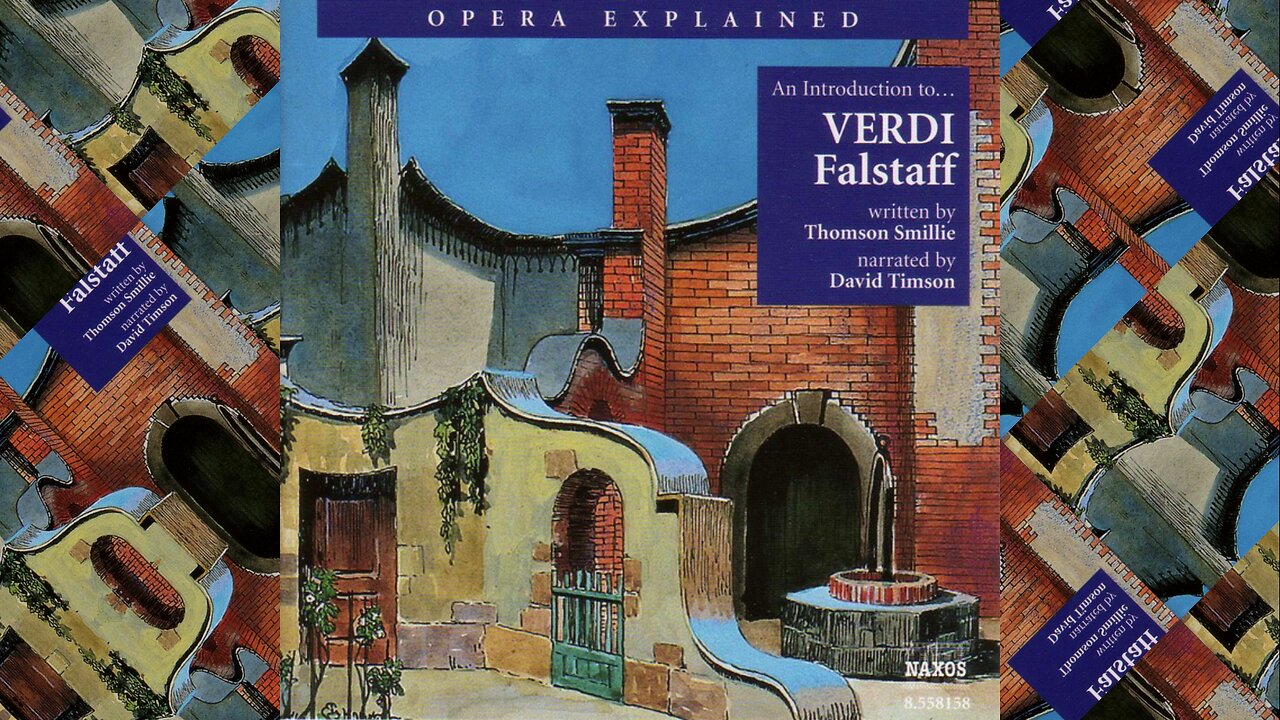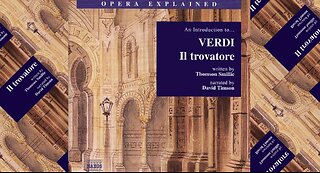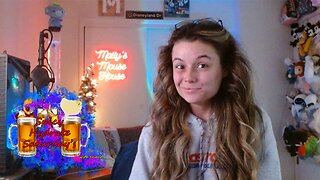Premium Only Content

Opera Explained | Falstaff by Giuseppe Verdi (Audio)
"An Introduction to...Verdi - Falstaff" written by Thomson Smillie, narrated by David Timson.
Verdi’s Falstaff is a glorious autumnal comedy, its libretto based on comic incidents from Shakespeare and set to music by the incomparable Italian composer Giuseppe Verdi. It is a brilliant compilation of scenes from Shakespeare’s plays Henry V parts 1 and 2, and the comedy The Merry Wives of Windsor, and centres around a series of hilarious adventures as the title character pursues a career of wooing for financial gain which is as doomed as it is engaging. It deserves to be the best-loved opera in the repertory, yet for many its charms are elusive. Can it be that the plot is dull? On the contrary, it is as action-packed as any Victorian dramatic potboiler. Is it lacking in interesting characters? Certainly not: Falstaff himself is one of the great creations of international theatre and the merry wives of Elizabethan Windsor are more than his match. Is it lacking in melody? Absolutely not! Verdi poured into this last work enough great tunes to provide a lifetime’s inspiration for any less prodigally gifted composer.
Maybe the problem – if there is a problem – lies in this very wealth of melody. It almost seems as if Verdi had enough of his best tunes left in him at the age of eighty to write another Il trovatore, another La traviata and one more Rigoletto – and poured them all into this last work. The result is that one superb tune follows another at such speed that we barely have time to grasp the quality of one before the next is upon us. It is in fact this aspect of the opera that makes an introduction to Verdi’s swansong so valuable. Melodic ideas which in any other opera would sustain a ten-minute aria are here blown off in a few seconds, so taking time to savour them – as we do in this introduction – is infinitely worthwhile.
It is of course opera’s greatest irony that the Italian master-tragedian who only seven years before had astonished the world with its greatest Italian tragic opera – Otello – should return in his eightieth year with a sublime comedy. That he should have chosen the poignant figure of Shakespeare’s Fat Knight for his last word in the theatre, where for many decades he had exposed the tragedy at the root of the human condition, is quite astonishing. But the final irony is that Verdi closed a brilliant career as the master of apparently spontaneous melody with a flawless academic fugue, right at the end of the opera. It is almost as if he was saying to his snooty detractors: ‘You see, I could have written a fugue all along – I just chose not to!’
And which words did he choose to set? Which passage most profoundly summed up a lifetime’s experience? Prospero from The Tempest, perhaps: ‘Our revels now are ended’? Puck’s epilogue from A Midsummer Night’s Dream, maybe: ‘If we shadows have offended…’? No, he took Jacques’ speech from As You Like It – ‘All the world’s a stage, And all the men and women merely players’ – and with his master librettist Boito altered it to: ‘All the world’s a joke and man is born clown’. For all our pretensions to wisdom we are simple fools.
Wagner, Verdi’s great contemporary and rival, had ended his career with a profound spiritual statement, Parsifal, whose depths we are still struggling to plumb. Verdi dismisses the human condition as mere folly. No one is qualified to say which is the truer philosophy or the more appropriate statement for a last artistic will and testament, but there is no doubting which is the more endearing.
Tracklist:
1. Introduction
2. Falstaff’s qualities
3. Verdi and Shakespeare
4. Shakespeare’s Falstaff and Verdi’s librettist
5. Opening: The Garter Inn
6. Falstaff ’s plan begins
7. Act I, Scene 2: the Fords’ garden
8. Enter Ford, Bardolph, Pistol, Dr Caius and Fenton
9. Act II, Scene 1: Mistress Quickly visits Falstaff
10. Enter Signor Fontana
11. Act II, Scene 2: inside the Fords’ house
12. Act III, Scene 1: Falstaff back at The 12 Garter Inn, soaked
13. Act III, Scene 2:Windsor Great Park
14. Enter the townspeople, disguised
15. Final pages of the opera
Performance:
Sir John Falstaff Domenico Trimarchi, baritone
Ford, husband of Alic Roberto Servile, baritone
Fenton Maurizio Comencini, tenor
Doctor Cajus Enrico Facini, tenor
Bardolfo, follower of Falstaff Alessandro Cosentino, tenor
Pistola, follower of Falstaff Franco De Grandis, bass
Mrs Alice Ford Julia Faulkner, soprano
Nannetta, daughter of Ford and Alice Dilbèr, soprano
Mrs Quickly Anna Maria Di Micco, contralto
Mrs Meg Page Anna Bonitatibus, mezzo-soprano
Chorus and Orchestra of Hungarian State Opera
Chorus Master: Anikó Katona
Conductor: Will Humburg
-
 1:19:08
1:19:08
Adaneth - Arts & Literature
13 days agoOpera Explained | Il trovatore by Giuseppe Verdi (Audio)
781 -
 2:45:39
2:45:39
Tundra Tactical
8 hours ago $16.60 earnedTundra Nation Live : The Worlds Okayest Gun Live Stream
39.3K -
 17:06
17:06
Professor Nez
5 hours ago🚨BREAKING: Elon Musk to BUY MSNBC!? Dems STUNNED by Brian Williams’ Viral Video!
32.5K36 -
![If You Smell LALALALA What CHiLi IS COOKING!!... #RUMBLETAKEOVER [Overwatch 2]](https://1a-1791.com/video/s8/1/e/s/X/3/esX3u.0kob-small-If-You-Smell-LALALALA-What-.jpg) 4:27:40
4:27:40
CHiLi XDD
8 hours agoIf You Smell LALALALA What CHiLi IS COOKING!!... #RUMBLETAKEOVER [Overwatch 2]
21.1K1 -
 LIVE
LIVE
Delnorin Games
8 hours ago🔴 Live - Star Citizen
1,153 watching -
 1:39:44
1:39:44
HELMET FIRE
10 hours agoDEADROP IS BACK!
127K6 -
 10:03
10:03
Tundra Tactical
12 hours ago $14.14 earnedBrandon Herrera Vies Bid for ATF Director!
80.1K15 -
 22:01
22:01
DeVory Darkins
1 day ago $34.15 earnedHakeem Jeffries SHUTS DOWN The View as Matt Gaetz Speaks out
70.3K110 -
 2:02:54
2:02:54
Mally_Mouse
11 hours agoLet's Play!! - Spicy Saturday
51.3K1 -
 1:33:06
1:33:06
Slightly Offensive
11 hours ago $28.42 earnedAre You Ready for What's Coming Next? | Just Chatting Chill Stream
69.5K40